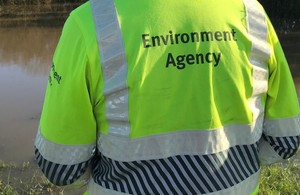Otter dies after being caught in illegal crayfish trap
The Environment Agency has warned of the dangers of illegal crayfish traps after an otter was found drowned near Bridport, Dorset.

The remains of the otter were discovered by a dog walker in the River Asker. The animal entered the trap, but was unable to escape because the device hadn’t been fitted with an otter guard. This is the second incident in recent weeks. A drowned otter was found in a similar trap in Cornwall.
Sandie Moors for the Environment Agency said:
“It is tragic this otter met its end by drowning in such a horrendous way. The trap was being used illegally on an unauthorised site. Eel nets and crayfish traps can only be used with permission from the land owner and the consent of the Environment Agency. Illegal traps put other species such as water voles and small dogs at risk.”
Eel nets and crayfish traps are licensed by the Environment Agency in a similar way that anglers need to licence their fishing rods. Each net/trap should display a numbered tag to allow identification and be fitted with a guard to prevent otters entering and becoming trapped.
Otters were common in the British Isles up until the 1950s, but became rare in many areas due to the use of pesticides, habitat loss and water pollution. Population levels were at their lowest in the 1980s. They are making a good recovery in Dorset, partly due to efforts being made to improve water quality, improved habitats and the restrictions on the use of harmful pesticides. However, there are still threats to their successful re-establishment primarily from road accidents but also the use of illegal nets.
The otter is a European Protected Species and is also fully protected under Schedule 5 of the Wildlife and Countryside Act 1981.
You’re breaking the law if you:
-
capture, kill, disturb or injure otters
-
damage or destroy a breeding or resting place
-
obstruct access to their resting or sheltering places
-
possess, sell, control or transport live or dead otters, or parts of otters
If found guilty of an offence you could be sent to prison for up to 6 months and be fined £5,000 for each offence.
Anyone who sees illegal nets, or who has information about this incident should contact the Environment Agency’s free 24 hour incident hotline on 0800 80 70 60 or Crimestoppers on 0800 555111.